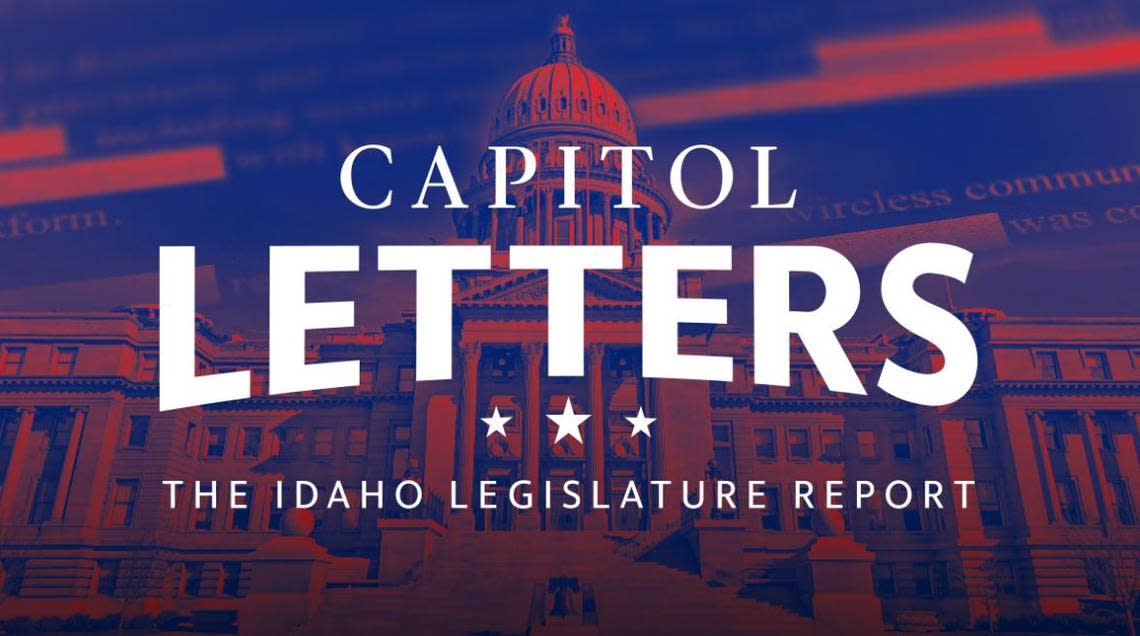Capitol Letters: Bill to restrict absentee ballot distribution clears committee

By Ryan Suppe, State Politics Reporter
A new Idaho bill would prohibit anyone but election officials from passing out absentee ballots and absentee ballot request forms.
Rep. Kevin Andrus, R-Lava Hot Springs, told the House State Affairs Committee yesterday that he “strongly” feels that candidates and campaign workers shouldn’t be passing out absentee ballots or forms needed to request a ballot from an election office.
The Idaho secretary of state’s office opposes the proposal.
Jason Lehosit, deputy policy director for Secretary of State Phil McGrane, a Republican, said current election practices balance access and security. Idaho’s 44 county clerks have limited staff to oversee elections for 1 million registered voters as it is, Lehosit said, and 13% to 14% of voters cast absentee ballots in a typical election.
“This legislation gives more control to government, adds unneeded red tape and regulation to a process which has already been working,” Lehosit said.
Rep. John Gannon, D-Boise, asked Andrus whether the bill would prohibit someone from passing out absentee ballot forms at a state fair. Andrus said it would, and he recommended using a QR code that a potential voter could scan to learn how to request an absentee ballot request form.
Gannon, who opposed the bill alongside two Republicans, said it would prevent Idahoans from “exercising their right to vote” with absentee ballots.
Rep. Brent Crane, R-Nampa, who supported the bill, said Idaho should strengthen its election laws to prevent fraud. Idaho does not have widespread voter fraud, Lehosit noted.
“Do we need to wait until there’s fraud before we can prosecute for fraud, or should we be looking to prevent fraud?” he said.
The bill heads to the full House.
Sex education bill defines ‘abstinence’
A House committee engaged in an uneasy conversation yesterday while debating a bill that would clarify the meaning of abstinence.
The bill, from Rep. Barbara Ehardt, R-Idaho Falls, was inspired by a federal sex education program that considers abstinence in the context of sex education means avoiding sexual activity that carries the risk of pregnancy and sexually transmitted diseases.
Ehardt said that definition is deceptive, and her proposal would clarify in state law that abstinence means the absence of “any sexual activity prior to marriage,” including physical contact with “intimate or private areas” that can result in pregnancy, disease or “emotional risks.”
“This allows for our parents to truly know that their child is participating in an abstinence program in the traditional sense,” Ehardt told the House Education Committee.
Rep. Steve Berch, D-Boise, asked whether someone’s mouth would be considered an “intimate” area and whether kissing would be considered sexual activity that presents emotional risks.
“I worry that he means the mouth being used for another part of someone else’s body, and I really don’t want to go there,” Edhart said. “Mouth to mouth has never had that kind of ‘private part’ sexual meaning.”
The committee advanced the bill to the full House.
Bill to require state board of education elections introduced
Currently, seven members of the eight-person Idaho State Board of Education are appointed by the governor to five-year terms. A new bill would require that board members are elected and reduce term lengths.
Bill sponsor Rep. Joe Alfieri, R-Coeur d’Alene, said yesterday that public education is the state’s largest expense, and the people who oversee its expense should be elected.
“I think that the people need a voice in how that operates,” he told the House State Affairs Committee.
The bill would create seven electoral districts, each represented by one elected board member, and board terms would be reduced to four years. Board candidates would be required to disclose their partisan affiliation.
The state superintendent for public instruction would remain as the eighth member of the board.
The committee voted to introduce the bill without discussion. It could return to the committee for a public hearing in the coming days or weeks.
What else happened?
The House cleared a bill that would allow parents to sue drag performers and drag show promoters if children can observe the performance. Ten Republicans joined 11 House Democrats opposing the bill. It heads to the Senate.
What to expect today
8 a.m. House Education. A public hearing for a bill, from Rep. Julie Yamamoto, R-Caldwell, that would restrict home-schooled families from receiving public school funds is on the docket. Also on the agenda is a public hearing for a bill that would require parental consent for students to participate in sex education.
8:30 a.m. House Ways and Means. Rep. Sage Dixon, R-Sagle, is scheduled to present a proposal dealing with signature requirements for a ballot initiative or referendum.
1:30 p.m. Senate Judiciary and Rules. The committee is scheduled to consider two bills dealing with the judicial branch. One addresses salaries, while the other, from Senate Assistant Majority Leader Abby Lee, R-Fruitland, relates to judicial resignations. Lee last year pushed a major reform to judicial elections that drew opposition from the legal community.
Find the full list of committee meetings and agendas for the House here, and for the Senate here.
Track other bills
Keep track of high-profile bills as they go through the legislative process. You can find yesterday’s updates here.
If you like this newsletter, forward to a friend or colleague, and they can sign up here.
